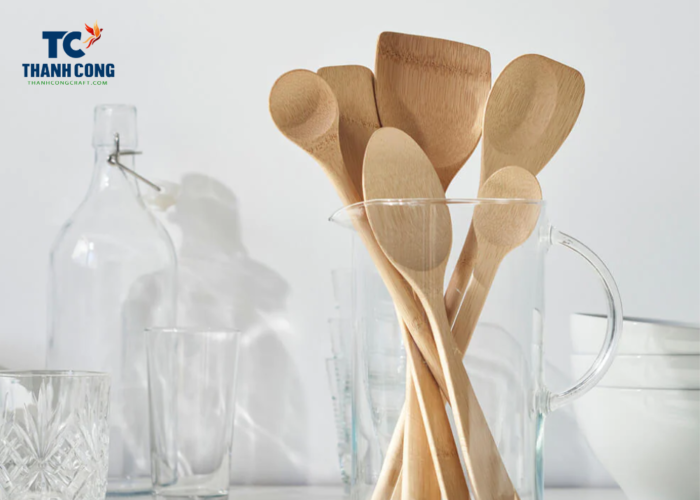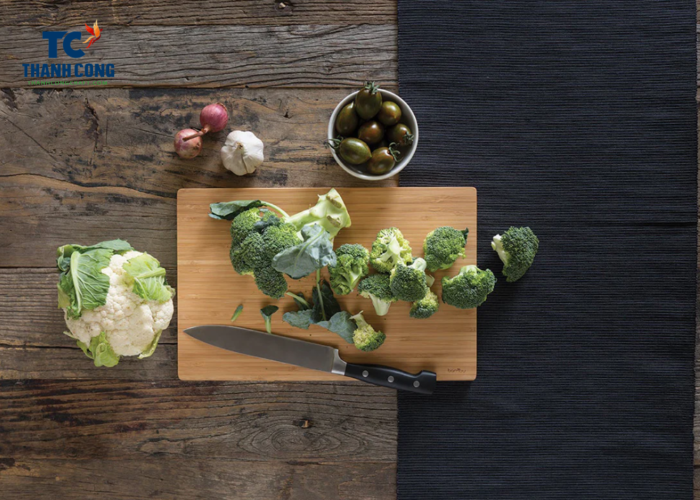Bamboo utensils stand out as an environmentally friendly and resilient option for your kitchen. Yet, to preserve their luster and longevity, proper care is essential. In this article, we will provide a comprehensive guide on how to care for bamboo utensils.
Contents
1. How to clean bamboo cutlery?
Bamboo is an environmentally friendly, durable and beautiful material, used to make many kinds of kitchen utensils, including eating utensils. However, to preserve bamboo eating utensils for a long time and keep them clean, you need to pay attention to how to clean and store them.
Here are some basic instructions on how to clean bamboo eating utensils.
- After use, you should wash bamboo eating utensils immediately with warm water and mild soap. Do not soak them in water for too long or use a dishwasher, as this can damage the bamboo material.
- After washing, you should dry bamboo eating utensils with a soft cloth or place them on a drying rack. Do not leave them wet or expose them directly to sunlight, as this can cause them to deform or mold.
- To maintain the shine and smoothness of bamboo eating utensils, you should apply a layer of vegetable oil such as olive oil or palm oil on their surface once a month. Vegetable oil will help prevent harmful bacteria and create a protective coating for the bamboo material.
- If bamboo eating utensils have stains or dirt that are hard to wash, you can use salt or vinegar to remove them. You just need to apply a little salt or vinegar on the stain and leave it for about 15 minutes, then rinse with warm water and mild soap.
2. How to care for bamboo utensils?
Bamboo is an eco-friendly, durable and beautiful material, used to make many kinds of kitchen utensils such as spoons, chopsticks, cutting boards and forks. To preserve bamboo utensils best, you need to pay attention to some of the following things:
- Wash bamboo utensils by hand with warm water and mild soap. Do not soak utensils in water for too long or use a dishwasher, as this can cause bamboo to crack or warp.
- After washing, dry bamboo utensils with a clean cloth or let them air dry. Do not leave utensils wet or damp in a place with high humidity, as this can cause bamboo to mold or develop bacteria.

- To maintain the shine and smoothness of bamboo, you can apply a layer of vegetable oil such as olive oil, flaxseed oil or coconut oil on the surface of the utensils once a month. To do this, you just need to dip a piece of clean cloth into oil and rub gently on bamboo, then let it dry completely before using again.
- You should also avoid using bamboo utensils for dishes that have strong colors or high acidity, as this can cause bamboo to stain or corrode. If you want to use bamboo for such dishes, you should choose ones that have been coated with a layer of paint or protective agent safe for food.
By following these tips, you can extend the lifespan of bamboo utensils and enjoy their benefits in cooking and eating daily.
3. FAQs
3.1 Can you put bamboo utensils in the dishwasher?
It is generally not recommended to put bamboo utensils in the dishwasher. The high water pressure, heat, and detergents used in dishwashers can have adverse effects on bamboo. These conditions may cause the bamboo to crack, warp, or lose its natural luster over time. Additionally, repeated exposure to the harsh dishwasher environment can accelerate the wear and tear of bamboo utensils.

For optimal care and to extend the lifespan of your bamboo utensils, it is advisable to hand wash them with mild soap and warm water. After washing, allow the utensils to air dry completely before storing them in a cool, dry place.
This manual cleaning method helps to preserve the integrity and appearance of the bamboo, ensuring that your utensils remain in good condition for an extended period.
3.2 Can you boil bamboo utensils?
It is generally not recommended to boil bamboo utensils. Boiling may cause the bamboo to absorb excessive moisture, leading to swelling, warping, or cracking. Additionally, prolonged exposure to high temperatures can affect the natural fibers of the bamboo and compromise its structural integrity.
For cleaning and maintaining bamboo utensils, it is best to stick to hand washing with mild soap and warm water. After cleaning, allow the utensils to air dry thoroughly before storage. This method helps to prevent unnecessary stress on the bamboo and ensures the longevity of your utensils.
If there are specific care instructions provided by the manufacturer, it’s advisable to follow those guidelines for the best results and to avoid any potential damage to the bamboo utensils.
3.3 Do bamboo utensils get moldy?
Bamboo utensils are tools made from bamboo, an environmentally friendly material known for its high durability. However, bamboo utensils can be susceptible to mold if not properly cared for. Some causes of mold growth in bamboo utensils include:
- Retaining moisture after washing. Bamboo utensils need to be thoroughly dried or air-dried after washing to prevent water accumulation and bacterial growth.
- Using them in the microwave or dishwasher. High temperatures and pressure can damage the protective coating of bamboo utensils, creating conditions conducive to mold growth.
- Lack of regular hygiene practices. Bamboo utensils should be cleaned with water and soap after each use to eliminate food particles and oils that can provide a stable environment for mold.
3.4 Do bamboo utensils need to be oiled?
Bamboo utensils don’t necessarily have to be oiled, but regular oiling can extend their lifespan and keep them in good condition. If you notice your bamboo utensils becoming dry or developing cracks, you can apply a small amount of mineral oil or bamboo oil (available at kitchen supply stores) to moisturize them. Use a clean and dry cloth to spread the oil onto the utensils. Without oiling, bamboo utensils may become prone to breakage or cracking with frequent use and washing.
3.5 What oil is best for bamboo spoons?
The best oil for bamboo spoons is food-grade mineral oil or bamboo oil. These oils are safe for food contact and can effectively moisturize and protect the bamboo. Food-grade mineral oil is a popular choice as it is odorless, tasteless, and does not turn rancid. Bamboo oil, specifically designed for bamboo and wooden products, is also a suitable option, often containing additional conditioning agents to enhance the wood’s natural beauty.
When applying oil to bamboo spoons, use a clean and dry cloth to ensure an even application. It’s advisable to avoid using cooking oils, as they may become rancid over time and can affect the taste of your food. Regular oiling helps prevent the bamboo from drying out, reduces the risk of cracks or splits, and enhances the overall longevity of your bamboo spoons.
If you have any further questions, don’t hesitate to send thanhcongcraft an email us at [email protected] or message us at WhatsApp: +84967485411. Hope to serve you soon! Best regard!


